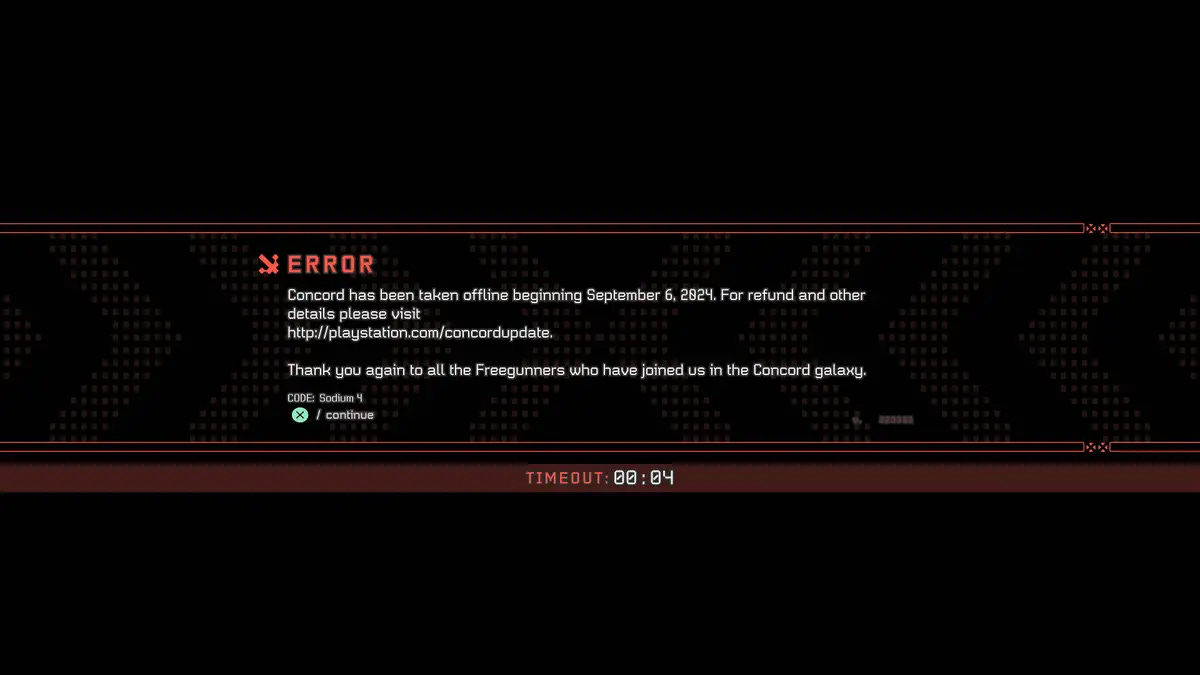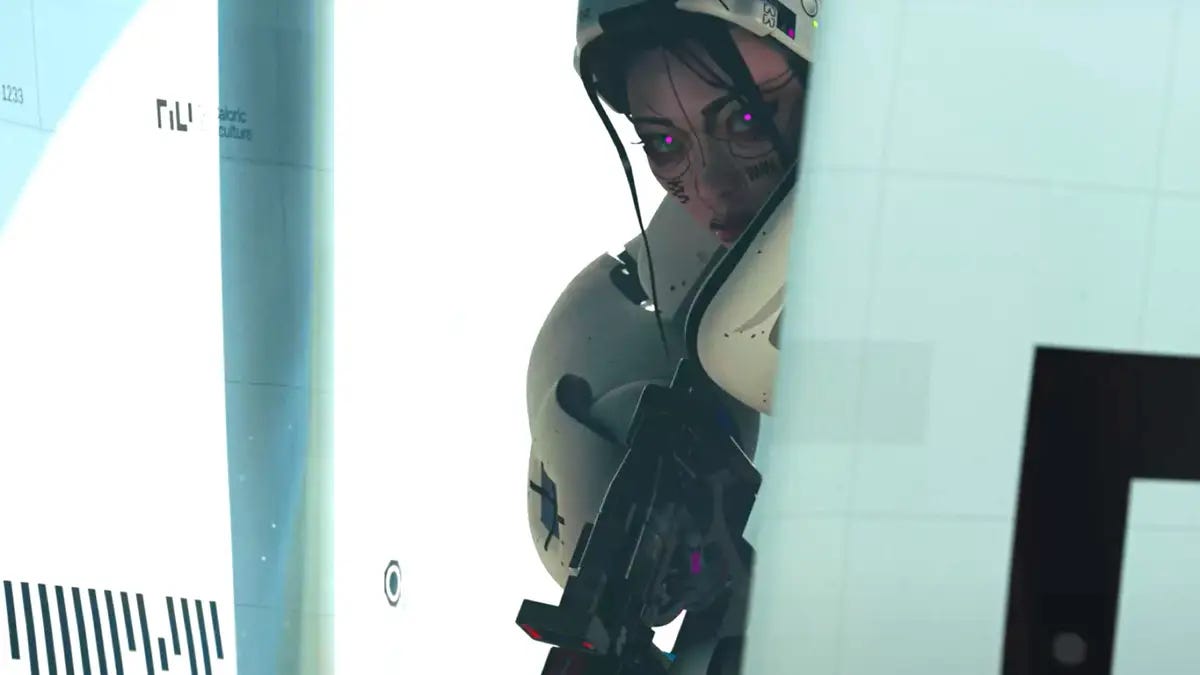Sony's shuttering of Firewalk Studios is a formal cremation of Concord - is there an ember worth sparking once again?
Should you own its disc, you can hang it from your tree to ward pests, along with your burnt CDs from the days of Limewire.
Through the darkness of future past, the magician longs to see, once chance out between two worlds: Firewalk without Sony.
Paraphrasing Twin Peaks’ evocative esoterica felt apt to preface a postmortem of Concord upon: a tale concerned with a central, stratified question of how evil in this world manifests itself. Bernard of Clairvaux, a theologian canonised as Saint Bernard once said "L'enfer est plein de bonnes volontés et désirs" - “Hell is full of good wishes and desires”. Indeed, Sony’s conception of a fruitful banquet of games-as-a-service began as a pious pursuit, designed to support the considered craft of their narrative teams. Titles of this persuasion required continual maintenance, yet their delivery could be controlled: content could be compartmentalised, abated to lessen crunch; revenue would arrive through a steady stream, rather than an initial flood. Regrettably, the crucible of consumer condemnation has burnt this ambition to a crisp - Helldivers 2 is the lone proponent of their good wishes and desires.
Firewalk Studios were formally acquired by Sony in April of 2023, only to be orphaned by October 2024.
The yarn of Concord’s demise is a deceptively short thread. Following an announcement cinematic in the precise tenor of Guardians of the Galaxy, brows were furrowed. Its presentation was at once photorealistic and fantastical, struggling to settle upon an aesthetic sensibility of its own. Consequently, its cast of characters were simultaneously uncanny and unremarkable; their designs seldom reflected their intrinsic attributes. For instance, take Winston, Overwatch’s erudite gorilla, as an effective exercise in conceptualisation. Upon first glance, one can recognise his role within a particular skirmish: he strikes a passive, smoldering figure, defensive in intent. Conversely, Reaper, an ambidextrous, cloaked character sporting a skull mask, presents himself as a herald of forthright aggression and cunning. This manner of stylisation serves both a diegetic and external purpose, cultivating community engagement through their bespoke manners of play.
Concord’s merry band of menaces, the majority of whom appear to be from an entirely different title than its trailer suggested, hardly strike an impression, nor indicate their potential means of play. Lennox appears to be a lone gunman with leadership qualities? The former is true, the latter is not. Why was he at the centre of the announcement trailer? Daw seems to have a sturdier build, perhaps serving as an enforcer? No, he is a healer. Bazz may fit into the mould of a wily hacker - not quite! Stealth is IT-Z’s speciality, whose casual clothes provide her with an unfortunate impression of a spectator who became an incidental competitor. Throughout its roster, the absence of defined, distinguished tones gave the game an unfortunate flattened appearance, as though the studio sought to prioritise play over personality. Additionally, its maps were kindred in their presentation, coloured by a curious synthesis of realistic textures against extraterrestrial chroma. Thus, when its UI overlay employs heath bars, outlines, and a death log, its crisis of character becomes particularly aggressive.
Colour coordination is an underappreciated element of multiplayer shooters - its efficacy is invisible, yet paramount. Each colour presented in this image is in active competition with one another.
Furthermore, despite its narrative framing, the game was revealed to be a 5v5, PvP arena shooter. Evidently, the marketing and development teams were not in conversation - a stark contrast to the referential barrage of banter provided by its ostensible heroes. Perhaps this was a conscious choice to set the tone of teammate coordination, elevating the toxicity of standard multiplayer discourse. Or, it could have been a matter of panic from the advertising braintrust, who could not decide whether to make a play for mighty Marvelites or competitive shooter enthusiasts. Regrettably, it was received as too derivative for the former, and … well, even more derivative for the latter. Upon launching its open beta, the game peaked at a concurrent player count of 2,388. Assuming each participant actively contributed to matchmaking, their engagement would yield 238 full games. Not great, Concord! Reviews, moreover, were similarly apathetic: a score of 64 on OpenCritic, accompanied by a paltry 20% rate of recommendation.
Subsequently, its formal debut produced 25,000 sales across PlayStation and PC, ranking 147th in daily active players on the former and an absolute peak of 697 concurrent Freegunners - an ironic title within a fatally premium game - on the latter. A week into its release, later known as halfway through its lifespan, the game settled upon a daily maximum count of 178 players, decaying on a scale defying atomic wisdom. The question at the time concerned whether Sony would cut their losses and render the title free-to-gun. This, however, would require a drastic overhaul of its monetisation model. Cosmetics were priced independently; greater means of purchase would have to be implemented as a salve against the removal of its $40 entry fee. Thus, the company elected to suspend Concord in orbit, taking the game offline with three days’ notice. In a manner reminiscent of the Cyberpunk 2077 catastrophe, Sony provided refunds to players of all platforms - 25,000 x 40 makes for 1,000,000, currency discrepancies notwithstanding. Consequently, the return on Firewalk’s $200 million pet project - post-acquisition expenditures excluded, including the purchase itself and ownership of the Concord IP - plunged into an abyss of loss twice over.
See you, space cowboy…
Hope, however, was not lost: perhaps Sony were simply evaluating Concord’s future within their portfolio. Amazon’s upcoming anthology series, Secret Level, features an entire episode set within its galaxy. A small, yet passionate band of Freegunners could emerge in an act of reclamation, on a scale kindred to Cyberpunk: Edgerunner’s rehabilitation of its inspirator’s reputation. Nevertheless, against astronomical margins of profit garnered through the third-party market for - effectively - annulled pieces of plastic, Sony perceived little possibility for redemption. Thus, the publisher closed Firewalk Studios a mere year and a half after its acquisition, banishing Concord to the catacombs of lost media. Per LinkedIn, Firewalk housed between 51 and 200 employees - a wide berth, though Bloomberg reporter and novelist Jason Schreier noted the team numbered 172. Regardless, this mass excision of talent portends a leaner, cutthroat evolution of PlayStation Studios’ guiding philosophy, leaving little margin of error. Ultimately, either one of their stables produces an instant hit, or they will be dispersed throughout their ecosystem or the whims of ad-hoc employment.
Again, as I detailed in my piece on Bungie’s Marathon, the stakes of its success have risen significantly upon this news. Granted, Bungie are in no immediate danger of being shut down - however, a continued reduction in their autonomy and labour will eventuate should Marathon stumble against its starting gun. Destiny 2, furthermore, turned seven this year; its final chapter is being gradually unravelled in an episodic manner to sustain intrigue. Considering that their next major title would release within a window of 2027 to 2029, its complexity would likely be informed by the specifications of the PlayStation 6 and its Xbox kin; the latter may rely upon cloud architecture to further its generation’s ambition. Would the studio, in tandem with its contemporaries under PlayStation’s purview, produce immaterial titles, reliant upon online delivery rather than hardware production? If Concord were exclusive to streaming, PlayStation could have pulled the plug to retool its elements significantly earlier. Nevertheless, this would have further hindered its accessibility - perhaps the only change one could make that would not serve as an improvement.
Marathon is scheduled to launch in 2025 - have you practiced cardiovascular exercise recently?
Is there a moral Sony can glean from Concord’s discordance? Last Stand Media founder Colin Moriarty reported to have spoken with a participant in Concord’s development, who claimed the team believed the game was the foundation of PlayStation’s future, reserving the potential to become Sony’s own Star Wars. Conceptually, I cannot envision a scenario wherein a single soul could hold this belief, particularly against its patchwork composition drawing extensively upon existent properties. Star Wars’ erstwhile novelty emerged from its fusion of the American Western with the Japanese Jidaigeki, pairing roguish heroes against feudal evil. Concord, conversely, is in conversation with Star Wars’ procession of imitators and iterations, whose aesthetics were codified from Star Wars itself, rather than its thematic ancestry. Furthermore, Concord’s heroes are detrimentally archetypal: not in a mythological regard, rather in a respect deferential to its gameplay. A franchise cannot flourish if it is explicitly populated by shorthands.
PlayStation Studios writ large are in a rather nebulous space. Throughout their major stables, only Sucker Punch have a confirmed release for 2025 in Ghost of Yōtei. Naughty Dog have yet to indicate their next step after the cancellation of their Last of Us multiplayer title; Insomniac ceded their plans for Spider-Man 2 DLC following their crippling hack of December 2023. As development times continue to become lengthier and more labour intensive, simply waiting for a marquee, story-driven title will not sustain Sony’s slate; they needed Concord to receive at least half of Helldivers’ enthusiasm. Now, their next live-service leap is at the mercy of a tenuous bungee cord.








A nice look at Concord's failure.